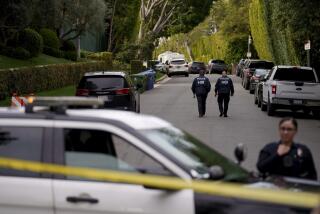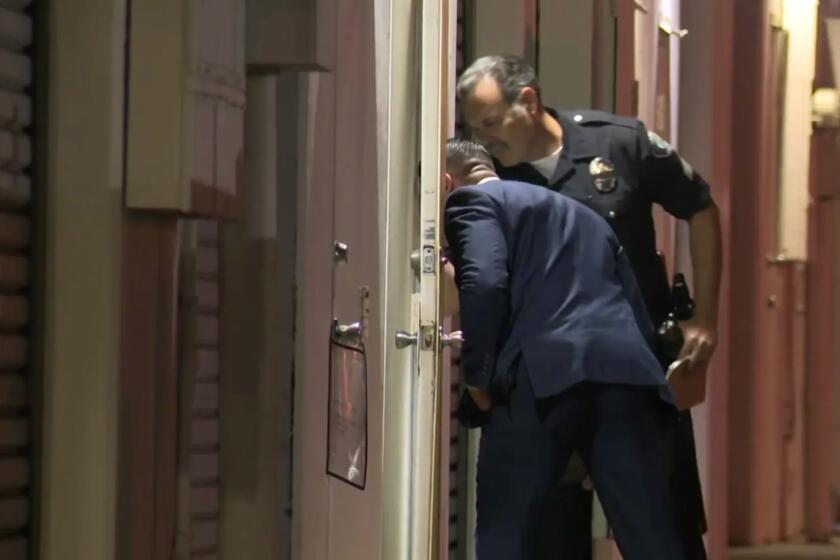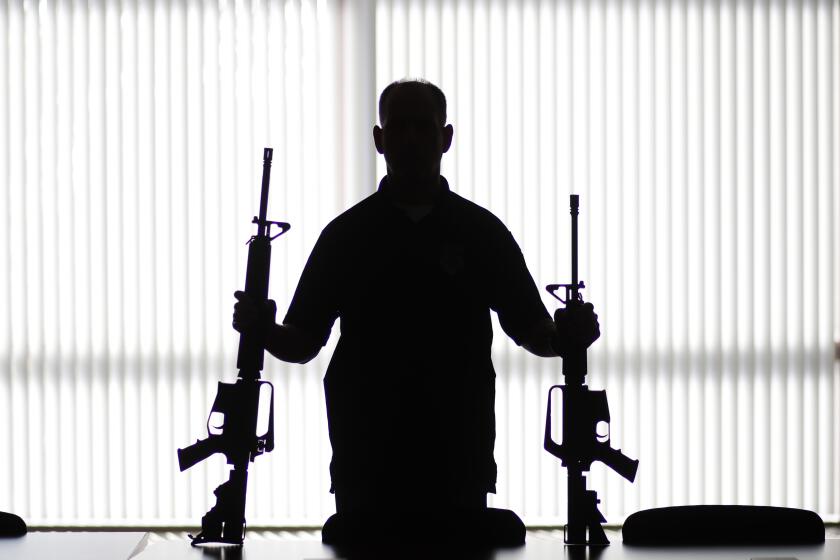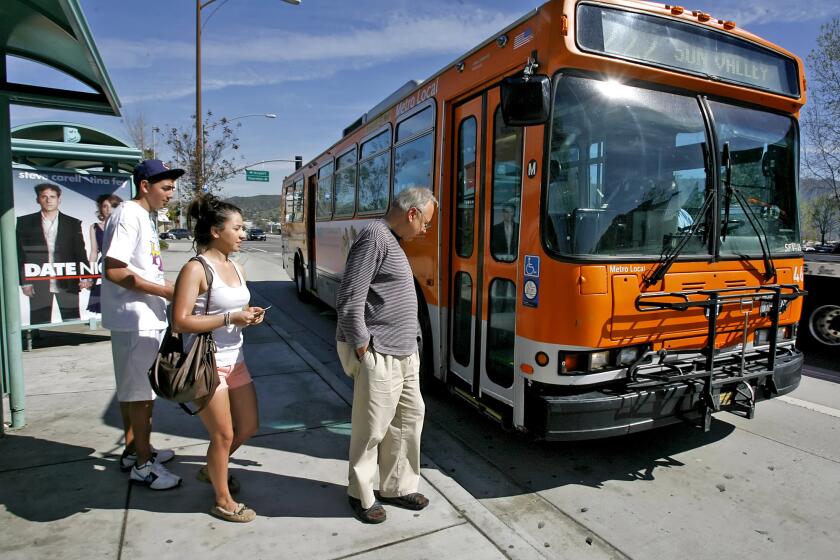Grand jury to probe origins of rap label
Moving into the final stage of a federal probe of Death Row records, the Justice Department has convened a grand jury in Los Angeles to examine the origins of the controversial rap label, sources said.
Prosecutors are focusing on the relationship between imprisoned Death Row owner Marion “Suge” Knight, his lawyer David Kenner and convicted Los Angeles drug dealers Michael “Harry-O” Harris and Patrick Johnson, sources said.
Federal agents are trying to determine whether Harris and Johnson--who were both previously clients of Kenner--may have contributed seed money to help launch the rap company, sources said.
Harris was recently moved from state prison to the Metropolitan Detention Center in Los Angeles and there is speculation in law enforcement circles that he and Johnson may soon be called to testify in front of the grand jury. However, sources close to Harris said he would not testify; representatives for Johnson could not be reached.
Justice Department officials have routinely declined to confirm or deny the existence of a Death Row racketeering investigation. Sources said, however, that the Justice Department is investigating Knight and others associated with the company for alleged tax violations and purported links to street gangs, drug trafficking, money laundering and violent acts.
Harris, who is serving a 28-year sentence for cocaine dealing and attempted murder, contends that he put up $1.5 million in late 1991 to underwrite the launch of Death Row. In a 15-page document prepared as a lawsuit last year but never filed in court, Harris says he cut his Death Row deal behind bars in 1991 during a visit from Knight and his lawyer Kenner. Law enforcement sources confirm that Kenner and Knight visited Harris in Lancaster prison nearly a dozen times in 1991.
Investigators are also looking into long-standing rumors in law enforcement circles that Johnson might also have been a silent partner in Death Row. Johnson, who grew up in the same Lynwood neighborhood as Knight, operated one the largest PCP drug rings in the nation during the late 1980s and laundered millions of dollars through real estate and other commercial ventures in the Compton area. He forfeited those assets upon entering a guilty plea.
The conclusion of the investigation, which sources say could result in criminal indictments against Knight and several others at Death Row, is months away.
Knight, who is serving a nine-year sentence at the California Men’s Colony in San Louis Obispo for an assault that violated the conditions of his probation, has repeatedly denied that any money from illegal activity financed Death Row.
Last month, agents from the FBI, the Internal Revenue Service, the Bureau of Alcohol, Tobacco and Firearms and the Drug Enforcement Administration descended upon Death Row’s accountant to review documents, sources said. Last week, investigators completed a second round of interviews with Los Angeles music executives, asking questions about Harris and his purported connections to Knight and Kenner.
At one time or another, Harris, Johnson and Knight were all clients of Encino attorney Kenner.
Kenner is one of a dozen individuals whom federal agents subpoenaed earlier this year to turn over documents related to the Death Row investigation. Law enforcement sources say investigators are trying to determine whether Kenner’s involvement in the company extends beyond his role as Death Row’s principal attorney.
Over the past two decades, Kenner, a USC Law School graduate and former county prosecutor, has represented a long list of criminals and established a reputation as an aggressive, well-prepared defense lawyer.
Kenner began to represent Knight in 1991--about the same time he helped negotiate a 30-year plea bargain for Johnson and during the same period he and Knight paid numerous visits to Harris in prison. Throughout the early 1990s, Kenner defended Knight and his former partner, Andre “Dr. Dre” Young, as well as Calvin “Snoop Doggy Dogg” Broadus and other Death Row associates in an assortment of cases ranging from assault to murder.
As Knight transformed Death Row from an unknown start-up into an industry powerhouse, Kenner’s stature and power at the label increased. Kenner eventually stopped taking outside cases and became Death Row’s principal lawyer, billing the company for millions of dollars in legal fees, sources said.
Over the years, Kenner expanded his duties from criminal law to entertainment law and began taking a hands-on role in negotiating artist contracts and other legal agreements for the company. In fact, it was a handwritten contract he drafted for rapper Tupac Shakur in prison that triggered a lawsuit after Shakur was slain last summer. Shakur’s estate accused Kenner of conflict of interest and of helping Knight bilk Shakur out of millions of dollars.
Although Knight is believed to be the sole owner of Death Row, competitors and sources within the label have long speculated that it was Kenner who controlled the purse strings at the company--an allegation that Knight and Kenner deny. Some of Knight’s associates even go so far as to privately blame Kenner for giving Knight legal advice that they feel may have put the rap entrepreneur and his company in jeopardy.
For instance, it was Kenner, they say, who negotiated a record deal last year with the 18-year-old daughter of a prosector involved in Knight’s 1992 assault case. In addition, Kenner rented a Malibu Colony home owned by the prosecutor’s family, in which Knight ended up living last summer.
Kenner, who is recovering from major heart surgery, was unavailable for comment. In the past, he has repeatedly denied any wrongdoing.
Meanwhile, Death Row continues to be dogged by violence.
Last month, a Death Row employee was gunned down in drive-by shooting in Compton. It was the third unsolved slaying of a Death Row associate in less than two years.
A second Death Row employee was killed in 1995 after an Atlanta industry party, and Shakur was slain in a Las Vegas shooting in which Knight was also wounded. That shooting is believed to have sparked a gang war in Compton, which may have been incited by gang members affiliated with Death Row, according a Compton Police court affidavit.
In recent weeks, investigators have been conducting extensive interviews with imprisoned criminals inquiring about the purported involvement of Death Row employees in criminal activity, sources said.
“It is our understanding that the government is spending a lot of time seeking out individuals who will say that Mr. Knight authorized or approved of criminal activities such as assault--and that is simply not true,” said attorney Milton Grimes, who was retained recently to represent Knight in connection with the federal probe. “Mr. Knight never authorized, approved or participated in any such crime.”
More to Read
Start your day right
Sign up for Essential California for news, features and recommendations from the L.A. Times and beyond in your inbox six days a week.
You may occasionally receive promotional content from the Los Angeles Times.






